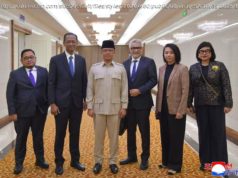Threat of ICBM reaching the USA demands nothing less: Our view
The North Korean regime demonstrated with a launch this week that it could strike extended portions of the United States with an intercontinental ballistic missile, or ICBM. With American civilian lives on the line in any conflict with the rogue nation, the stakes are rising.
The test was conducted on America’s Independence Day, no less, a thumb in the eye of our president, who vowed in a January tweet that North Korea’s goal of developing a nuclear-armed ICBM «capable of reaching parts of the U. S. … won’t happen!»
Donald Trump relied for months on his charm offensive with Chinese President Xi Jinping during a meeting at the Mar-a-Lago estate in April to enlist China in squeezing its recalcitrant neighbor. About 85% of North Korea’s trade is through China, earnings that fund a rapidly advancing missile program while more than 70% of the regime’s 25 million people are barely subsisting.
China agreed last spring to stop buying North Korean coal, but not before overall trade with North Korea actually increased by 37% for the first quarter. Xi could bring North Korea to its knees by cutting off oil, but he fears a collapsing regime that would flood China with refugees and risk a unified — and democratic — Korean Peninsula with U. S. troops on his border.
So Trump must face the same reality as previous presidents: China believes the lesser of two evils is tolerating an erratic neighbor.
OTHER VIEWS:
The good news is that Trump has tools to dramatically raise the costs to China for tolerating North Korean provocations and has already started taking steps. North Korea raises money for its militarism not only from trade that violates United Nations sanctions, but also by operating like a criminal enterprise with drug dealing, counterfeiting and arms sales. This requires access to international financial networks — often through China-based banks and institutions — for laundering illicit income or carrying out trade purchases and sales in violation of the sanctions. These deals can largely be in dollars, so by sanctioning the banks, the U. S. Treasury Department can cut them off from the dollar system, preventing transactions with international financial networks. This can lead to financial ruin, particularly for medium or large institutions that rely heavily on the international banking system.
President Bush in 2005 sanctioned one small, Macao-based bank that funneled money for North Korea, and the reverberations that followed led to at least two dozen other financial institutions around the world to cut ties to Kim Jong Un’s regime. They included some of China’s largest banks, such as state-owned Bank of China.
President Obama raised China’s ire last fall threatening similar actions against a host of Chinese banks and businesses working with North Korea. When Trump took office, he didn’t follow through, instead trusting that Xi — post Mar-a-lago — would crack down on the renegade firms. But that gambit has gone no where.
Last week, Trump finally acted, cutting off the Bank of Dandong — a small regional Chinese institution that helped finance North Korean missile development — from the U. S. financial system. The message to Xi was finally clear: Either assist in shutting down North Korean financial streams, or risk U. S. actions that could have wider implications for Chinese banks.
The Chinese banking system is a soft spot for the dictatorial regime in Beijing. The communist government has long propped up its economy with a shaky scaffolding of dubious loans. Any U. S. moves that threaten that financial system could have far-reaching and dire consequences. The Trump administration should not be shy about quickly ratcheting up the pain for Xi’s government. The threat of a North Korea missile reaching the USA demands nothing less.
Still more could be done to dissuade North Korea from its ICBM path short of military strikes that risk escalating and leaving tens of thousands dead in South Korea. During successful efforts to pressure Iran into halting its nuclear program, the Treasury Department sanctioned more than 800 people. By contrast, fewer than 100 people have been sanctioned in connection with North Korea. Kim could be further isolated by persuading more countries to ban flights from North Korea’s airline, Air Koryo, or by the U. S. Navy blockading ships carrying sanctioned goods.
Experts estimate that within a year to 18 months, North Korea will develop an ICBM that can reach the continental U. S. with a nuclear weapon.
Trump must use that time to exact severe costs for Kim’s brinkmanship.
USA TODAY’s editorial opinions are decided by its Editorial Board, separate from the news staff. Most editorials are coupled with an opposing view — a unique USA TODAY feature.
To read more editorials, go to the Opinion front page or sign up for the daily Opinion email newsletter. To respond to this editorial, submit a comment to letters@usatoday.com .






